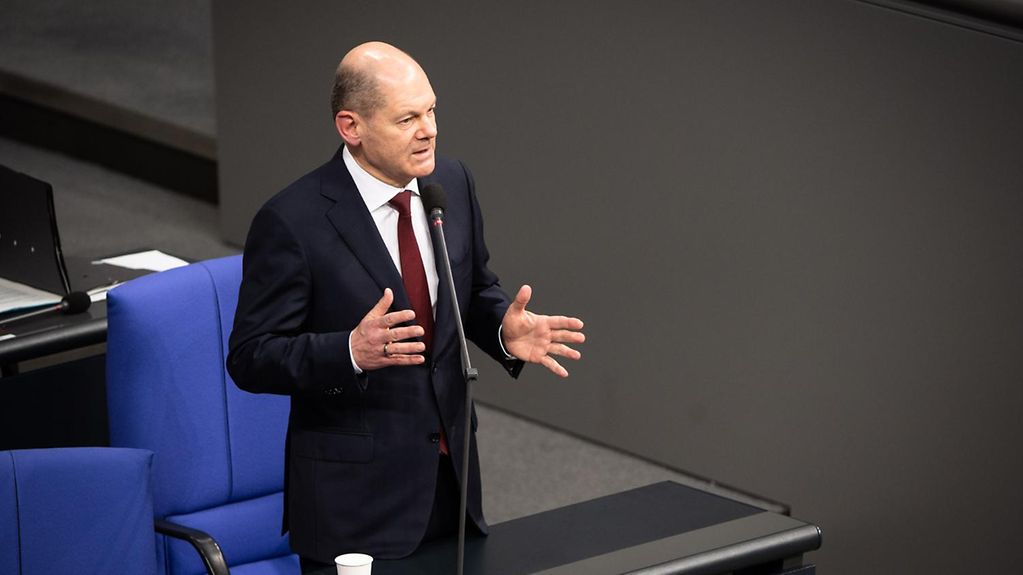Government question time in the Bundestag
For the first time, Federal Chancellor Scholz answered questions put by members of the Bundestag at government question time. He encouraged more people to get vaccinated in the fight against the coronavirus pandemic. In addition, he addressed the Ukraine conflict, the G7 Presidency and the Federal Government’s energy policy.

Germany would continue to pursue a “clearly defined” path through the pandemic, said Federal Chancellor Scholz in the Bundestag.
Photo: Federal Government/Steins
During government question time in the Bundestag, Federal Chancellor Olaf Scholz said that the measures taken to combat the pandemic to date were a key factor in tackling the current wave of infections. The far-reaching measures, including contact restrictions, were having the “desired effect”, he said, and the infection rate with the Omicron variant in Germany was showing a “very different pattern compared to other countries as things currently stand”.
Scholz made it clear that this was also due “to the clear-cut, far-reaching measures we have imposed.” The decisions taken by the Federal and Länder Governments had enabled “Germany to continue to pursue a clearly defined path through the pandemic”, said Scholz. The Federal Chancellor also said that, as in other countries, there would be “more infections due to the Omicron variant”.
Getting vaccinated is not a decision we take in isolation
Scholz again called on people to get vaccinated. The vaccination helped limit further infections with the dangerous virus, he said, thereby protecting “80 million fellow citizens”.
According to Scholz, the decision to get vaccinated is not one we take in isolation, because it has consequences for others – “for our whole country, for our own friends, for our neighbours”. Examples include the measures adopted to contain the pandemic as well as the funding that has to be provided “for hospitals so that they have room to accommodate those who are infected”. It was also important to remember other patients whose operations had to be postponed, he said.
“Speedy and sound deliberation” on vaccine mandate
Scholz reiterated his support for a vaccine mandate for adults. He said he hoped for “speedy and sound deliberation” in the Bundestag leading to the desired outcome. “I myself consider a vaccine mandate to be necessary and will campaign for it actively,” says Scholz. He noted that the goal of 30 million booster jabs by Christmas had been achieved. “My ambition now is for us to administer more than a million vaccinations per day.”
Crisis in Ukraine a “serious threat”
Scholz also commented on foreign policy matters. “The annexation of Crimea was unacceptable,” said Scholz, adding that the territorial integrity of Ukraine had been violated. The Federal Government would work together with the EU and NATO towards greater security in Europe, he said.
The Federal Chancellor pointed out that the NATO-Russia Council is due to meet again today for the first time in a long time. There had also been talks between the USA and Russia, he said, and the issue would also be negotiated within the framework of the OSCE. “What is more, we’re actively ensuring that there will be opportunities to revive the Normandy format again – talks between the countries that set this process in motion to overcome the crisis in Ukraine,” said the Federal Chancellor.
This crisis posed a “serious threat to security in Europe”, he said, and the deployment of Russian troops along the Ukrainian border was “very, very worrying” for him personally. It was once again vital to ensure “that borders in Europe are no longer shifted and that the territorial integrity of its states remains unharmed”, said Scholz.
Challenges of the G7 Presidency
The G7 Presidency involved enormous challenges at this time, said Scholz. “We have set ourselves a very clear agenda. The overriding issue is to bring about the large-scale social transformation that is required to tackle climate change.”
These are major challenges facing the industrialised countries of the G7. It was necessary to take very different measures in the various countries to combat climate change, he said. “We have to agree not to fight against each other but to move in the same direction,” said Scholz.
Germany took over the Presidency of the G7 at the beginning of the new year. This means that it will be hosting the annual summit of the G7 heads of state and government, an event that is considered the highlight of every Presidency.
Nuclear power not sustainable
The use of nuclear energy is not sustainable and does not make economic sense, said Scholz, noting that considerable investments would be necessary to guarantee the supply of power with new nuclear power plants.
It was an “expensive path” that involved many unresolved issues, he said, including disposal and the ongoing matter of safety. “Germany decided to phase out the use of nuclear power because of the risks involved, and that was the right thing to do,” he stressed. Scholz noted that the expansion of renewable energies was being accelerated to enable nuclear power and coal to be replaced.
After the Federal Chancellor’s question session, ministers will also present their major plans in the Bundestag in the course of the week.